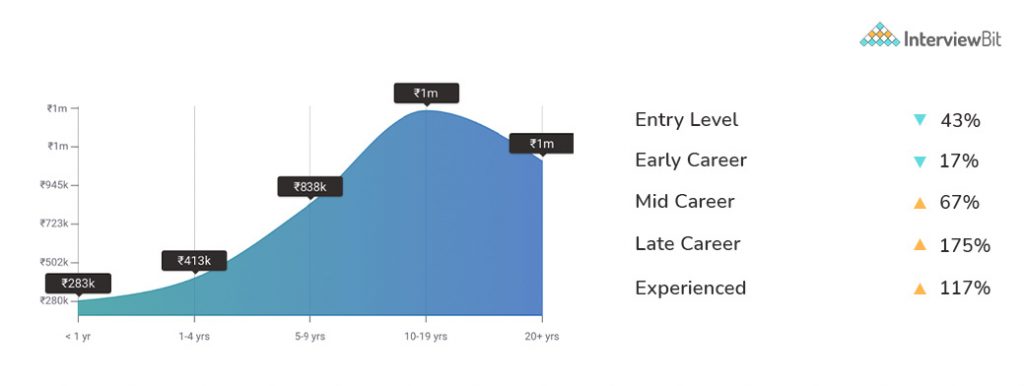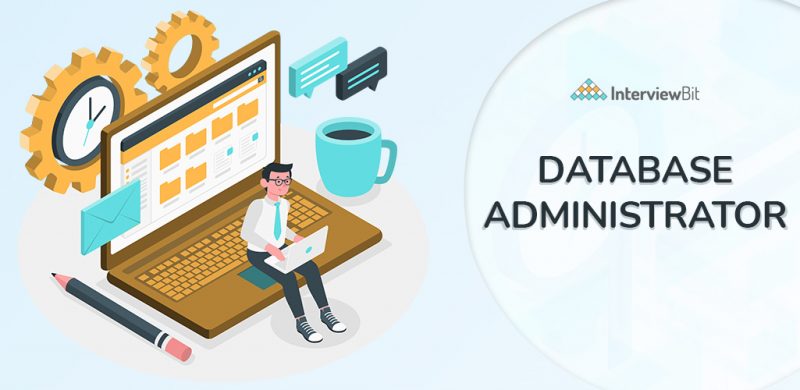The accelerating growth of data has consequently introduced to us the concept of Databases. The database is the location where all the large chunk of data is stored and maintained for accessing and using it for different purposes.
- What is Database Administration?
- What is a Database Administrator?
- What is the demand for this role?
- 1. Flourishing Future Prospects
- 2. Prominent Job Profile
- 3. Opportunity for Learning and Growth
- 4. Better Pay Opportunities
- Database Administrator Salary
- 1. Salary Based On Experience
- 2. Salary Based on Location
- 3. Salary Based on Employer
- 4. Salary Based on Skill Set
- How to Become a Database Administrator?
- Step 1: Earn a Degree
- Step 2: Master Database Administrator the Skills
- Step 3: Find your Speciality
- Step 4: Start Working by taking small steps
- Database Administrator Job Description
- Database Administrator Resume
- 1. Resume Summary or Objective
- 2. Relevant Experience
- 3. Not All skills Qualify
- 4. It’s not about the Length
- Conclusion
- Frequently Asked Questions
What is Database Administration?
Database Administration is a highly skilled task that is involved in the management of data. It is a methodology that caters to designing, analyzing, maintaining, securing, storing, and managing the data stored in the databases. In the process of managing a lot goes into thought about capacity planning, methods for easy accessibility, and configuring solutions for the existing and new errors in the system.
It is a much-needed function that processes a whole lot of data set for strategic and insightful purposes.
Confused about your next job?
What is a Database Administrator?
A database administrator is a technical guardian of data. With the assistance of database administration, the administrator manages the data resources for different applications and purposes. It includes:
- Database planning and designs
- Database security
- Database performance
- Database functionality
- Database Solutions
- Database Recovery
- Troubleshooting
- Database Performance and Monitoring, and so much more.
In all, a database administrator enables the purpose of using data for greater and better prospects with the help of creating systems to maintain, secure, store, and analyze the data.
Data is now a significant part of the growing industry and businesses. It is the fuel every business needs to drive better results.
Therefore, data administrators are crucial to industries like IT, Banking, Finance, Health, etc.
For example, suppose a banking company has to maintain all the financial records of the company and its clients. A DBA (database administrator) uses software to maintain and provide easy access to them whenever needed.
The database administrator will ensure that the data is secure and available to the interested parties for strategic decisions.
What is the demand for this role?
We have talked about how data is now a bigger part of every industry. There is no denying the fact that a Database Administrator is a job profile with an excelling future prospect. It is qualified by many as one of the best technology jobs. Let us look at why there is such demand for a data administrator in India.
1. Flourishing Future Prospects
A database administrator is a good career option for a long-term scope. There is a tremendous amount of data involved everywhere and all the big companies need an administrator to manage and query the databases.
Therefore, it is not a job position that could die off so easily. Even according to some stats, there is a good 10% growth rate in the demand for Data Administrators.
2. Prominent Job Profile
All the top-tier companies have huge chunks of datasets that need to be used for their business purposes. Companies like Facebook, Amazon, Google, etc, have a wondrous amount of data on a daily basis that needs to be managed. Hence, there is a surging demand for database administrators amongst some of the top companies which as a result, highlights the significance of this job position.
3. Opportunity for Learning and Growth
Managing and administrating Big data (a large volume of structured and unstructured data) is not just a walk in the park. It requires the necessary skills and methodologies to maintain and manage that data for future use. Such a task involves great learning opportunities every day. It grinds your brain cells and opens up new doors for you. You can get a chance to explore different industries every step of the way.
If you’re dedicated, and determined enough, this job position will help you learn and grow every day.
4. Better Pay Opportunities
As there is quite a high demand for this role, plus the task is not a cakewalk, there is a good average base salary for a database administrator.
Ultimately, many aspirants choose a profession that guarantees financial security and future growth. A database administrator’s profile could help you with the same.

Database Administrator Salary
The responsibility of a database administrator is a challenging position that requires proper skills and training. It is self-evident that with the high demand for this position, the average database administrator salary in India is significantly good.
The average base salary for a Database Administrator in India is ₹500,165 per annum. The average salary range can go from a minimum of ₹238k per annum to a maximum of ₹1 Million per annum.

The salary of a database administrator is naturally directly affected by many factors like:
- Experience
- Location
- Employer
- Skill Set
1. Salary Based On Experience
Experience is tied directly to affecting the average base salary for a database administrator. The level of seniority reflects your knowledge of the industry and field.
In addition to this, experienced employees are no longer involved with the basic tasks of database management instead, are hired to drive strategic solutions to manage and access data for better performance and output for the company.
Look at the table below to see how experience plays into account affecting database administrators’ salary.
| Experience Years | Average Base Salary/annum (In INR) |
|---|---|
| Fresher (>1 year) | ₹283,122 |
| Early Career (1-4 years) | ₹413,337 |
| Mid Career (5-9 years) | ₹837,663 |
| Late Career (10-19 years) | ₹1,373,694 |
| Experienced (20+ years) | ₹2,584,793 |

Note: The higher the level of seniority, the higher the average pay structure. However, there is a small downfall for the 20+ years employees if they do not upskill themselves with time.
2. Salary Based on Location
Location is yet another factor affecting the database administrator’s salary in India. There are some locations that have better job opportunities, more demand for candidates, and, naturally, become a hub of thriving possibilities.
For example, Bangalore is known for its IT sector and has so many options for aspiring candidates whereas, there is not much talk about cities like Jaipur, Chandigarh, etc. Therefore, there seem better pay structures at some locations than others.
Read below to see what locations have better salary opportunities for a database administrator.
Bangalore, Karnataka
The average base salary for a database administrator in Bangalore is ₹614,998 per annum and total pay ranges from ₹316k – ₹2m.

Pune, Maharashtra
The average base salary for a database administrator in Pune is ₹542,782 per annum and total pay from ₹245k – ₹1m.

Chennai, Tamil Nadu
The average base salary for a database administrator in Chennai is ₹571,492 per annum and the total pay from ₹277k – ₹1m.

Mumbai, Maharashtra
The average base salary for a database administrator in Mumbai is ₹413,769 per annum and total pay ranging from ₹217k – ₹1m.

Hyderabad, Andhra Pradesh
The average base salary for a database administrator in Hyderabad is ₹509,934 per annum and the total pay from ₹250k – ₹1m.

Gurgaon, Haryana
The average base salary for a database administrator in Gurgaon is ₹523,810 per annum and total pay ranging from ₹176k – ₹2m

New Delhi, Delhi
The average base salary for a database administrator in New Delhi is ₹434,247 per annum and total pay ranging from ₹223k – ₹1m

Kolkata, West Bengal
The average base salary for a database administrator in Kolkata is ₹440,401 per annum and the total pay from ₹272k – ₹1m

Ahmedabad, Gujrat
The average base salary for a database administrator in Ahmedabad is ₹305,209 per annum and the total pay ranging from ₹158k – ₹1m

3. Salary Based on Employer
There are always better chances for job prospects with top-tier companies. Their workload, demand, and status can affect the average salary of a database administrator.
Therefore, working at companies like TCS, Deloitte, Amazon, and other top companies in India which have a large set of databases to be administered, provides significantly higher salaries to its employees.
Here are the Top 10 companies that hire Database Administrators
- Amazon, India
- International Business Machines (IBM) Corp., India
- Cognizant
- HCL Technologies Limited
- Tata Consultancy Services
- Accenture Technology Solutions
- Infosys Limited
- Capgemini
- Tech Mahindra Ltd.
- Wipro
Look at the difference in their salary range in the table below –
| Company Name | Average Base Salary/annum (in INR) |
|---|---|
| Amazon, India | ₹2,440,225 |
| International Business Machines (IBM) Corp., India | ₹975,915 |
| Cognizant | ₹705,000 |
| HCL Technologies Limited | ₹600,000 |
| Tata Consultancy Services | ₹558,000 |
| Accenture Technology Solutions | ₹549,000 |
| Infosys Limited | ₹485,925 |
| Capgemini | ₹442,500 |
| Tech Mahindra Ltd. | ₹479,167 |
| Wipro | ₹425,000 |
4. Salary Based on Skill Set
There are many skills besides the basic skills required to become a database administrator. Certification or specialization in certain skill sets could positively affect the average base salary of a database administrator.
Find the table below to see how different skills can have different salary structures for a database administrator.
| SkillSet | Average Base Pay/annum (In INR) |
|---|---|
| Oracle | ₹754,054 |
| Microsoft SQL Server | ₹475,977 |
| SQL | ₹453,622 |
| Amazon Web Services (cloud computing) | ₹693,000 |
| IBM DB2 Skills (Database Management) | ₹841,230 |
How to Become a Database Administrator?
The path to becoming a successful database administrator is no joke. It requires a lot more steps and acquiring the necessary skills and mastering them.
The position of a database administrator is a significant one and one can achieve greatness with proper planning ahead. We are here to simplify the process for you. Keep reading to find the right steps to become a database administrator.
Step 1: Earn a Degree
If you are interested in database administration from early on or decided to pursue this option, earning a degree can be your first step.
There is no compulsion to earn a bachelor’s degree to apply for the data administrator job position. However, many top-tier companies and at your initial stages with no experience degree could help you take a long way.
So, getting a bachelor’s degree in Computer Science and Information Technology or any other related field could help you give the right start. It will assist you in understanding the fundamental concepts of database administration.
Step 2: Master Database Administrator the Skills
To become an amazing database administrator, you are required to have a specialization and proficiency in skills required for a database administrator.
1. SQL
Structured Query Language is a programming language that is used for managing databases. It is a language that is designed to retrieve, store, manage, and update data on the database management system.
A database administrator should have in-depth specialization in SQL as it is one of the core languages for maintaining databases. The most common databases that use SQL as their language are PostgreSQL, MySQL, etc.
2. Web Technologies
Data resourcing has changed over the course of years. There are multiple mediums of resourcing data. One of the most important mediums in present times is the Web or the Internet.
For databases to participate in web applications, a database administrator is required to have a basic knowledge of web technologies. Web Servers, TCP/IP, Firewalls, APIs, etc are some of the technologies required to help you do the same.
3. Data Modelling
A database administrator should have comprehensive knowledge of data modelling to ensure a coherent, efficient and effective database management design.
Such skills are vital to a database administrator to have a smooth functioning process in the organization and easy access and maintenance of data.
4. Data Security and Troubleshooting
When data is of pivotal use to the company, it needs to remain secure as well. There are so many risks to the data stored in a database system like cyberattacks, backup issues, etc. To maintain the security of such significant data, particular measures, tools, and methods are necessary.
A database administrator should have complete knowledge about the tolls for ensuring data security.
5. Soft Skills
Every employer looks for several other skills as well in a potential candidate besides technical skills. These skills are soft skills. They define the person’s attitude, behaviour, and personality towards everything.
So some of the soft skills required for database administrator are:
- Attention to Detail
- Time Management
- Organizational Skill
- Problem-solving and analytical skills
- Communication skills
Step 3: Find your Speciality
You need to understand that there are different types of database administrators, just like different types of doctors. You need to find your specialization. Different categories cater to individual needs one focuses on designing and system building while the other focuses on maintenance. Pick out which one works for you the best.
1. System Database Administrators
System DBA’s focus is on the general purpose and technical working of the databases. Their speciality lies in ensuring the smooth functioning of database systems and avoiding any type of damage or loss of data. They also are responsible for looking out for new updates or working out the kinks in the existing systems.
2. Application Database Administrators
Application DBAs are specialized professionals who focus their work on a particular application. For example, Oracle Administrator will be a specialized professional to handle everything for Oracle databases. They will be responsible for designing the database to manage the functionality of the databases for particular applications.
You need to find out what you prefer when starting out as a database administrator.
Step 4: Start Working by taking small steps
It is always preferable that to become a successful database administrator, you start with small steps. To be a part of some big top-tier company, you require experience.
Gain this experience from working at small startups, pick up on freelancing projects or build something of your own.
Gaining experience or working until you find your dream job will give you a practical sense of working as a database administrator.
We have already read above how experience plays into account in deciding the database administrator’s salary. So, start working. Working should never make you stop learning.
You will be an expert in the field only when you keep practising every day. You need to work on finding the right field, mastery over the skills and so much more. So advance professionally, keeping in mind what goals you have.
There is no hard and fast rule to become a database administrator. However, these steps will help you guide on to the right path in becoming a database administrator.
Database Administrator Job Description
A Database Administrator is an IT expert who administers the software designed to manage databases. The administrator is responsible for maintaining that software for easy access to the database in times of need.
The maintenance of such large databases is not limited to just easy access, but the responsibility extends to securing the databases, looking out for servers’ rapid access control, and managing the integrity of significant data.
The database administrator is preferred to have a bachelor’s degree or a certified course in data administration to manage the daily and high-level responsibilities of the position. The DBA will be accountable for maintaining data consistency and ensuring proper methodologies, an analytical solution for configuring errors in the existing and updated systems.
With the right expertise in skills like SQL, Cloud computing, and database administration, the DBA is responsible for planning what management systems work best for the clients or the organization.
Database Administrator Job Roles and Responsibilities follow as given below –
- Maintain new database management systems
- Configure solutions for the existing database systems for smoother functioning
- Manage, store and create a repository for metadata for clarity and precision
- Simplify the database models for representation to the interested parties
- Ensure a proper and robust strategy for the data backup process
- Monitor the performance of database systems and structures for optimized results and enhanced functioning
- Plan out the data capacity requirements early on.
- Adhere to Data Protection Laws and ensure complete Data security
- Communicate regularly with the IT/Technical team to ensure about data networks, data integrity and data security
Database Administrator Resume
Creating the perfect resume for a database administrator is tough but not impossible. Certain things need to be kept in mind while building a professional resume. This section will help you exactly with them.

1. Resume Summary or Objective
Whether you are a fresher or an experienced employee, your resume cannot be without a resume summary or objective.
For a fresher mention the goals and what you aim to be as a database administrator.
For an experienced employee, talk about in a brief what you have achieved as a database manager and your skills. It gives the right start to your resume.
2. Relevant Experience
People tend to just write their role in the previous company they have worked wherein, a relevant experience section should talk about numbers and the impact of your job position.
If you are a fresher talk about relevant points you achieved in your school or college regarding the skills required for a database administrator.
For example: Talking about your managing or organization skills, mention your previous roles as treasurer suppose could work well as a database administrator.
3. Not All skills Qualify
Do not clutter your resume with too many of all the skills you acquire. Every job position requires a different set of skills. Tailor the skills section according to the type of role you are applying for.
Suppose applying for a senior position and mention in your skills section just SQL, Microsoft Office, and WordPress. These skills are not relevant to your profile and hence, instead focus on mentioning Cloud Computing, Oracle, SQL Server, etc.
4. It’s not about the Length
A good resume is not about the number of pages instead, the limit should be of a single page. The format of a resume should focus on the idea of ‘less is more. ‘
Do’s
- Add a link to your projects or portfolio
- Attach a cover letter
- Side margins measuring 1-inch.
- 1.15 point line spacing.
- Keep the format and font readable, clear, and professional.
Don’t’s
- Forget about spelling errors
- Write the summary in the passive voice
- Mention too many personal details
- The hobbies and Interests section is longer than the skills section
- Sending the same resume for different profiles
- Not updated with the latest information
You are all set to build your resume. Start working now and send it off to all your listed companies.
Conclusion
In this fast pacing world, where everything is booming, Data growth is also thriving. The data is not only growing in size but in its significance as well. Industries have realized the true potential of data and, to extract its value, people need Data Administrators.
If you have an interest in managing and maintaining software that is designed to maintain a large set of data, then Database Administrator is the right career choice for you.
A data administrator position will offer you great learning opportunities, the prospect of working with top-tier companies, and a good pay structure.
So, if you are thinking of becoming a database administrator, this is the time to hop on it and start achieving your goals.
Frequently Asked Questions
Q.1: How do I become a database administrator?
Ans: The pathway to becoming a database administrator involves the following steps:
- Earn a degree in information and computer science and Information technology or any other relevant field.
- Master the skills required- SQL, Oracle, Data Administration, Soft Skills, etc.
- Find your speciality
- Gain work experience
- Practice daily
Q.2: Is database administrator a good career?
Ans: Yes, being a database administrator is a good career option. Data is growing at an influential rate and every industry is using data for its expansion and growth. Therefore, there is surging demand for data administrators in companies and, pay is also significantly good.
Q.3: Do Database administrators need programming?
Ans: There is no compulsion for database administrators to learn to program. However, for better opportunities and to stand out from the crowd, you could have a basic knowledge of some programming languages like C++, Python, C#, etc.
Q.4: What are database skills?
Ans: The top 7 skills required for Database Administrators are:
- SQL
- Data Modelling
- Web Technologies
- Oracle Databases
- Cloud Computing
- Database Security Skills
- Soft Skills like organization and communication skills, time management, patience, attention to detail, etc.
Q.5: Which DBA certification is best?
Ans: The following are the top 3 DBA certifications:
- IBM Certified Database Administrator – DB2
- Microsoft SQL Server database certifications
- Oracle Certified Professional, MySQL Database Administrator, etc







 Join WhatsApp Group
Join WhatsApp Group


